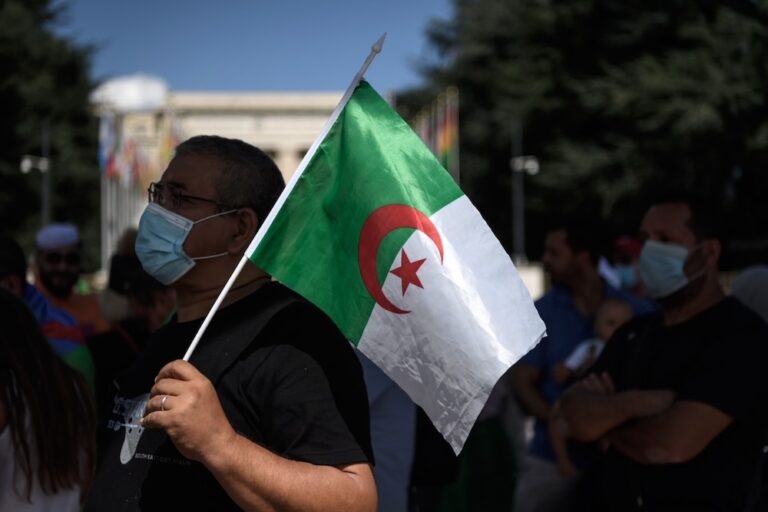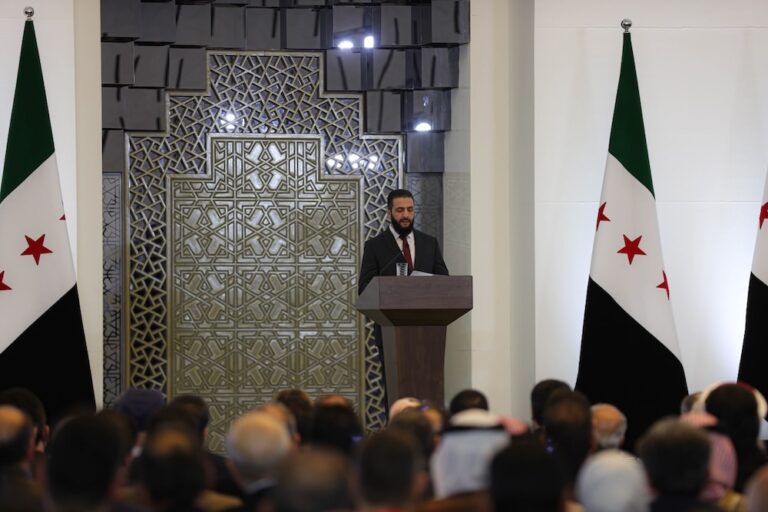Russia recently passed a law banning LGBT "propaganda" six months before the opening of the 2014 Winter Olympics; this has reignited the debate over whether it is acceptable for repressive, nondemocratic countries to host international sporting events.
When Russia’s State Duma overwhelmingly passed a law banning LGBT “propaganda” on June 11, 2013, just six months before the opening of the 2014 Winter Olympics in the Russian city of Sochi, there was a surge of concern among LGBT athletes, trainers, and fans that police would arrest them during the games based on their sexual orientation or gender identity. While the International Olympic Committee (IOC) and the Russian Interior Ministry have given mixed signals on whether the law will be enforced during the games, the mere existence of such a law in an Olympic host country is indicative of a broader pattern in which authoritarian governments continue to bask in the spotlight of prestigious international sporting events despite rampant domestic human rights abuses.
After the spectacle ends and the Olympic torch makes its way to the next host city, all Russians, not just the LGBT community, will still have to live with repressive laws. The list of President Vladimir Putin’s victims has grown inexorably during his 14 years in power, and now includes journalists, human rights campaigners, peaceful protesters, orphans, and deceased corruption whistle-blowers.
Putin expects that the Winter Olympics will be his crowning moment, and that showing billions of viewers a glamorous version of Russia, replete with bright lights and large stadiums, will distract the world from the corruption and repression that dominate the country. His expectations are not unreasonable; the same has happened before.
In the months leading up to the Beijing Olympics in 2008, there was much pressure for a boycott given the Chinese Communist Party’s persecution of political dissidents and ethnic and religious minorities, among other abuses. Momentarily bowing to international pressure from democratic countries, China promised to improve its repressive policies. Yet after the opening ceremony, which was hailed by the press as the “greatest” ever, the world diverted its attention from human rights and instead focused on the lavish production. No sooner had the torch left China than an even tougher crackdown by Chinese authorities began, and all promises were forgotten.
The current situation in Russia has reignited the debate over whether it is acceptable for repressive, nondemocratic countries to host international sporting events. After all, many of these events, such as the Olympics and soccer’s European Cup, cite respect for human rights and the rejection of any form of discrimination as part of their mission statements and governing statutes. But if current trends are any guide, dictatorships will remain free to disregard those values and still host international events.
Indeed, authoritarian regimes are increasingly vying to host such events, sparing no expense to outbid their competitors and essentially buy the international legitimacy that seems to accompany the competitions. The sports’ governing bodies are all too willing to take the money and look the other way, even though past experience suggests that these events, far from bringing democratic changes, actually reinforce dictators’ power and confidence, and in some cases lead to worse abuses.
Here is a look at recent and upcoming events hosted by some of the world’s worst human rights offenders:
Country: Equatorial Guinea
Event: African Cup of Nations 2012
Freedom House Status: Not Free
A veteran on Freedom House’s annual “Worst of the Worst” list, this small nation has been subject to the corrupt and repressive rule of President Teodoro Obiang Nguema Mbasogo for more than 33 years. As the third-largest oil producer in sub-Saharan Africa, Equatorial Guinea has a GDP per capita equal to that of Switzerland, and yet over two-thirds of the population lives in poverty. When this country was picked to cohost soccer’s 2012 African Cup of Nations, Obiang stated that he viewed the event as an opportunity to “sell the country’s image.” That image was by all means what he wanted it to be, as the domestic media are controlled by the government, and the few foreign correspondents allowed into the country for the competition were closely monitored. Since the regime’s use of its massive oil revenues is not transparent, it is hard to know how much was really spent on hosting the cup. However, buildings constructed in Equatorial Guinea for a 2011 African Union summit included an $830 million conference center, resort, and artificial beach. Needless to say, there are better ways to allocate resources in a country where one in every eight children does not live past the age of five.
Country: Bahrain
Event: Bahrain Grand Prix
Freedom House Status: Not Free
The Bahraini monarchy’s crackdown on ongoing antigovernment protests has led to the deaths of more than 80 people since February 2011. The unrest prompted the cancellation of the 2011 Bahrain Grand Prix, a Formula One race hosted annually by the kingdom, as many of the teams refused to participate. Since then, however, the competition has carried on, proceeding as planned in 2012 and 2013 despite the objections of human rights groups. The royal family, which controls all aspects of public life, has banned journalists from entering the country and censored media outlets that attempt to cover the protests or speak out against the government. Meanwhile, the government has taken every opportunity to dismiss accusations of human rights abuses and ignore calls for political reform.
Country: Azerbaijan
Event: European Games 2015
Freedom House Status: Not Free
When Azerbaijan hosted the 2012 Eurovision song contest, an event that is watched by approximately 120 million viewers each year, it was seen as a controversial choice given the country’s poor human rights record. Azerbaijani activists used the increased foreign media presence to call attention to the various human rights violations that have occurred during the rule of President Ilham Aliyev. In the aftermath of the competition, many of these activists were imprisoned, including a lawyer who defended families that were displaced in order to build a performance hall for the event. Aliyev and other high government officials labeled the activists “anti-nationalistic” and “traitors.” The rest of Europe appears to be unconcerned by the government’s ongoing crackdown on civil society and political opposition, as Azerbaijan has been awarded the honor of hosting the first European Games in 2015.
Country: Qatar
Event: World Cup 2022
Freedom House Status: Not Free
The price tag for soccer’s 2022 World Cup, which will be held in Qatar, is estimated at an astounding $200 billion, with facilities that include air-conditioned stadiums and a new city built for the participants. Qatar is an absolute monarchy that harshly suppresses domestic dissent, but the labor force used to build these World Cup megastructures has been the focal point for criticism by human rights activists. Only about 12 percent of the emirate’s population are Qatari nationals; the rest are noncitizen residents and migrant workers. Exploitation of migrant workers is commonplace, and exit visas give employers the power to ban workers from leaving the country, leaving them more susceptible to abuse. Qatar clearly has ambitions to host other major events, having bid unsuccessfully for the 2020 Olympic Games and the 2017 World Championships in Athletics.
Country: Belarus
Event: 2014 International Hockey Championship
Freedom House Status: Not Free
Given its long list of political prisoners and even longer record of human rights abuses, Belarus’s selection by the International Hockey Association to host the 2014 International Hockey Championship is troubling. President Alyaksandr Lukashenka’s rule has been brutally repressive, with laws banning even the most innocuous forms of protest – such as clapping and displays of teddy bears – and constant harassment of the media and the opposition. In last year’s parliamentary elections, Lukashenka’s loyalists ran nearly unopposed, with key opposition candidates and parties either excluded from the ballot or pulling out of the race to protest clear evidence of rigging.
Country: Russia
Event: Winter Olympics 2014, World Cup 2018
Freedom House Status: Not Free
Then there is Russia. The country’s anti-LGBT laws have encouraged violent acts against the maligned groups, drawing comparisons to the treatment of Jewish people under the Nazi regime in Germany. In the next five years, Russia is scheduled to host two of the most prestigious sporting events in the world. However, its laws contradict the spirit of the competitions. While the IOC continues to reassure the world that the ban on LGBT “propaganda” will not affect persons attending or participating in the Olympics, Russia’s Interior Ministry has stated that it will be in effect during the games.
Instead of taking a tough stand against the gross human rights abuses occurring in the host country, the IOC has done little but seek clarification of the laws. In fact, the IOC has warned athletes that they should comply with Rule 50 of the IOC Charter, which prevents any form of political demonstration. It seems that the committee has forgotten other language in its charter, including the call for “preservation of human dignity” and the declaration that “any form of discrimination with regard to a country or a person on grounds of race, religion, politics, gender or otherwise is incompatible with belonging to the Olympic Movement.” The IOC should take a cue from FIFA, soccer’s international governing body, which has warned that its statutes prescribe “zero tolerance” of discrimination on the basis of sexual orientation, among other categories.
However, if sporting bodies fail to act appropriately when faced with egregious abuses by would-be host countries, it is up to democratic nations around the world to give glory-seeking dictators the cold shoulder they deserve.


